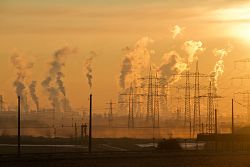

The UK government has spent £680 million of its foreign aid budget on fossil fuel projects since 2010, analysis says.
The analysis highlights the UK's failure to align diplomatic, trade and aid policies with the goals of the Paris Agreement.
Britain allocated more overseas development money to oil and gas in the two years after signing the 2015 Paris agreement than it had in the previous five, according to the study commissioned by the Catholic development agency Cafod, and carried out by the Overseas Development Institute.
Although the UK has also increased support for renewables, Cafod said the continued support for carbon-intensive energy in middle-income countries was diverting resources that should be used to help poor communities gain access to electricity from wind and solar power.
Sarah Wykes, Cafod's lead analyst on climate change and energy said: "The UK wants to be a leader on climate change, so it's shocking that UK aid money is still being spent on fossil fuels overseas".
"At a time when we are reducing the UK's own reliance on fossil fuels, why are we spending billions of pounds saddling poorer nations with outdated technologies that will cause more climate damage? The whole point of development aid is to improve the lives of people living in poverty. The government needs to align its aid spending with its climate goals and urgently commit to ending all new aid for fossil fuels".
As UK parliament have declared a climate emergency and announced plans to cut greenhouse gas emissions to net zero by 2050, next year it is expected Britain will host a United Nations climate summit, where nations will try to draw up plans to limit further global heating.
Nevertheless, the Cafod study shows these efforts are not reflected in the government's development policies. From 2010-17 the UK provided £7.8 billion in financial support to foreign energy projects through a mixture of overseas development assistance, export credit guarantees, and other official funding flows. The report says 60% of this total went on fossil fuels.
Most of this came in the form of export credit guarantees by UK Export Finance. An earlier analysis by DeSmog UK, an investigative environmental journalism outlet, found an elevenfold increase in the UK Export Finance support for overseas fossil fuel projects last year. This including oil and gas operations in Oman, Kuwait and Brazil.
The Department for International Development stressed that it has provided 17 million people with access to clean energy, but recognised the need to shift further from fossil fuels.
A government spokesperson stated that we need to do more if we are going to meet the goals of the Paris Agreement on climate change.
"As the prime minister announced at the G20 last month, in future we will look for the greenest way to deliver UK aid. Developing countries will be hardest hit by climate change. We cannot eradicate poverty without also protecting the environment".
For more information on this subject see: